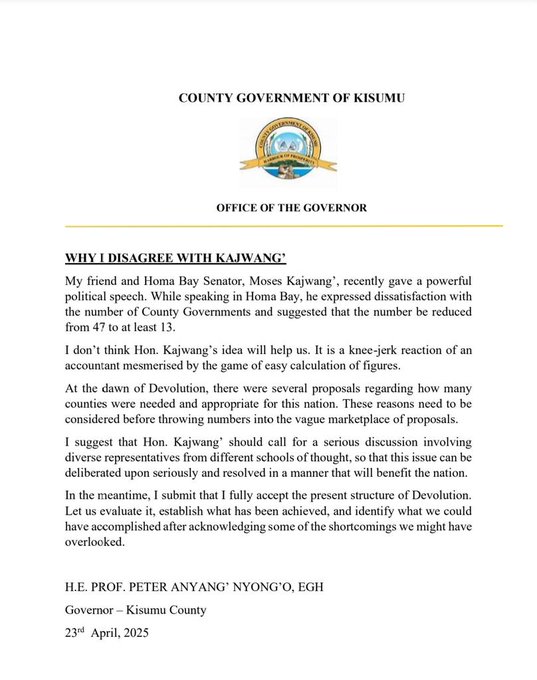NAIROBI, Kenya — Kisumu Governor Prof. Anyang’ Nyong’o isn’t having any of it. After Homa Bay Senator Moses Kajwang’ floated the idea of reducing Kenya’s counties from 47 to just 13, Nyong’o fired back — calling the proposal nothing more than a “knee-jerk reaction” driven by number-crunching, not nation-building.
With devolution now over a decade old, this latest clash reignites a long-simmering debate: should Kenya cut down its county governments to boost efficiency, or double down on improving the system we already have?
Senator Kajwang’, speaking at a public forum in Homa Bay, argued that many counties are financially unviable, citing a firsthand review of their books.
He proposed a constitutional amendment to collapse the current 47 counties into roughly 13 larger ones — a throwback to earlier drafts of Kenya’s devolution blueprint.
“We have too many counties,” he said. “We need economies of scale. Most of our county governments simply don’t make financial sense.” His view echoes concerns from other leaders who feel the high cost of managing 47 mini-governments isn’t sustainable long-term.
But Governor Nyong’o was quick to shoot down the pitch.
WHY I DISAGREE WITH KAJWANG’My friend and Homa Bay Senator, @moseskajwang, recently gave a powerful political speech.While speaking in Homa Bay, he expressed dissatisfaction with the number of County Governments and suggested that the number be reduced from 47 to at least 13.
Nyong’o: Don’t Fix What’s Not Broken (Yet)
Calling the proposal “a reactionary view of an accountant mesmerized by numbers,” Nyong’o defended the current structure of devolution as hard-won and still evolving.
He insisted that the original logic behind Kenya’s 47-county model — equity, inclusion, and localized service delivery — deserves more thoughtful examination before any drastic shake-ups.
“Let’s not reduce devolution to a math problem,” he warned. “We need sober, inclusive discussions — not vague proposals tossed into the public square.”
Instead of fewer counties, Nyong’o is advocating for a national evaluation of what devolution has achieved and where it’s fallen short.
The Bigger Picture: Reform or Reflection?
This isn’t the first time the devolution system has come under scrutiny. With ballooning wage bills, overlapping roles, and uneven development, critics argue the current model is due for a reboot.
But for Nyong’o and others, slashing county numbers isn’t reform — it’s regression.
He’s calling for a comprehensive, cross-sectoral dialogue that involves constitutional experts, economists, and citizens alike.
“We can’t afford to tamper with the devolution framework without understanding what we’re giving up,” he said.




